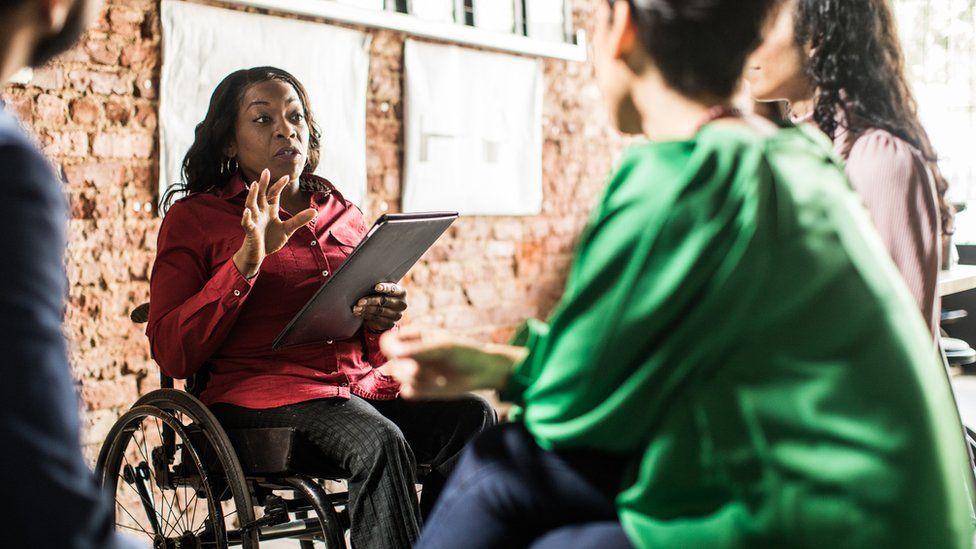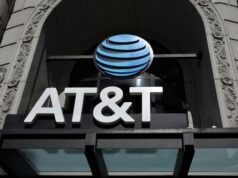Increasingly for businesses, factoring in the needs of disabled customers from the start is becoming a crucial part of product development. Yet this huge market – the so-called “Purple pound” – remains largely untapped as many firms are failing to successfully adapt for customers with disabilities.
The purple pound refers to the spending power of disabled households and is now worth some £274bn a year to UK businesses, according to the advocacy group Purple.
As one in five of us is likely to experience some sort of disability in our lifetime – how can firms successfully access the purple pound market and improve their bottom line?
Emma Vogelmann, from disability equality charity Scope, hopes that the easing of Covid restrictions will be a turning point – ushering in a “new normal”, reducing some of the barriers faced by disabled people when accessing businesses and services.
Sam Latif, Proctor and Gamble’s (P&G) accessibility leader, realised many of its products were “not as inclusive or accessible as they could be” when she took up her role.
One example was its Herbal Essences shampoo and conditioner bottles, which felt “identical”, making it difficult for people with impaired sight to tell them apart, she says.
P&G has since added “tactical markings” to the bottles, so people can tell them apart. “We have four stripes for shampoo and we have circles for conditioner that are embossed on the bottle,” says Ms Latif, who describes herself as 97% blind.
Ms Latif says her own experiences have given her “insights that the company would need to understand things that we need to improve in our products”.
This shampoo and conditioner bottle redesign not only benefits the visually impaired, but also helps people with soap in their eyes or who are not wearing glasses or contact lenses to ensure they use the right product.
“The business case is clear. If we intentionally serve 20% of the population that previously maybe we hadn’t thought about, it just makes business sense,” says Ms Latif.
P&G has also remodelled its Olay skin care jar to make it easier to open for people with dexterity problems, she adds.
Emma Vogelmann at Scope says that with our lives moving more online as a result of Covid, firms need to be aware that some customers with disabilities may face barriers using certain websites and apps.
“One of the biggest things businesses could do is to make sure they are testing their websites and apps with a wide range of disabled people.
“It’s only through user-testing that you are able to pick up barriers faced by a specific group of people – you wouldn’t be aware of those areas unless [you yourself are] faced with them,” she says.
Robin Sheppard, co-founder of Bespoke Hotels, says that staying in some hotel rooms designed for customers with disabilities amounts to a form of “punishment”.
Mr Sheppard, who has Gillian-Barré syndrome – a rare and serious condition that affects the nerves – says rooms often have very limited views and “humdrum décor and no sense of style”.
His company has been trying “to put some style and some swagger into the look and feel of the bedrooms, and a much more joyous sense of colour and verve”.
The idea is that there is no perceptible difference between rooms designed for visitors with disabilities and the rest.
“Ultimately the aim has to be to have all hotels with a new level that it’s become a non-issue – it’s just normal, it’s just the way it is,” he says.
His work is paying off, with disabled-friendly rooms at one of his hotels each generating over £7,000 more revenue than other bedrooms.
Equal access to shop floors and places such hotels, restaurants and bars is vital.
“If you have the most accessible building in the world and then the security guard says, ‘No mate, you can’t bring a dog in here’, then you are not getting inside that building,” says Gavin Neate, the founder of Neatebox which has developed a training app to improve customer service.
“The truth is that unless staff understand how to interact with disabled people and the needs of disabled people, then all of these services and products are going to be absolutely useless.”
His top tips to improve access is to employ more people with disabilities in the first place, and then train all of the staff better.
“Ask your staff members about disability and what they know. Then constantly ask them…because you can’t just train somebody, tick a box saying you’ve trained and then expect that they are going to remember it forever.”
Some firms make a “great effort” to consider the needs of their customers with disabilities, but some could “certainly be doing more”, says Emma Vogelmann.
Businesses with a large number of disabled workers “do particularly well because their disabled employees are able to influences policies and decision which are made in that organisation and come from a place of lived experiences,” she says.
“Other businesses that chose to engage with their disabled customers also really benefit from that. They understand the value of the purple pound and are not going to ignore the huge spending potential of disabled people.
“When they take those steps to be inclusive, they really encourage loyalty from disabled customers to continue to use their brand because they feel valued,” she says.
Ms Vogelmann says she hopes businesses will retain some Covid restrictions, such as reducing the number of customers in a shop at the same time, to make it a “less overwhelming process” for some those with disabilities.
Redesigning existing products or services to make them appeal to a disabled clientele is much more expensive than thinking about disability from the start, says Sam Latif.
“If you try to bolt it on at the end, of course there is going to be a cost,” she says.
Proctor and Gamble has incorporated audio description into its TV and video advertising, at a cost of 0.001% of the marketing budget for the brand. “It’s nothing, yet you can reach 2.2 million people in the UK alone with that investment,” Ms Latif adds.
One of Ms Latif’s tasks in her role has been in opening “the hearts and minds” of senior managers at P&G.
She made the executives experience things first-hand – by getting them to wear glasses simulating sight loss, using a wheelchair or wearing gloves that restrict hand movement.
“Then we’d get them to open a pack of Pampers or tell us the difference between shampoo and conditioner. At that point, really the penny drops,” she says.
But does there have to be a “light bulb” moment for businesses to access the untapped purple pound market? Do firms not have a moral duty rather than just being encouraged by potential profits?
“That’s a really interesting question,” responds Scope’s Emma Vogelmann. She says the purple pound “is just another argument to be made for why disabled people need to be included and why it is so important to have an inclusive offer”.
Sam Latif, Company Accessibility Leader at Proctor and Gamble, Robin Sheppard, Co-Founder and President of Bespoke Hotels and Gavin Neate, Chief Executive and Founder of Neatebox spoke to Evan Davis for The Bottom Line on BBC Radio 4.
What these new codes in supermarkets will mean
The power of the ‘purple pound’
Disability web access: ‘I’ve already clicked away’










